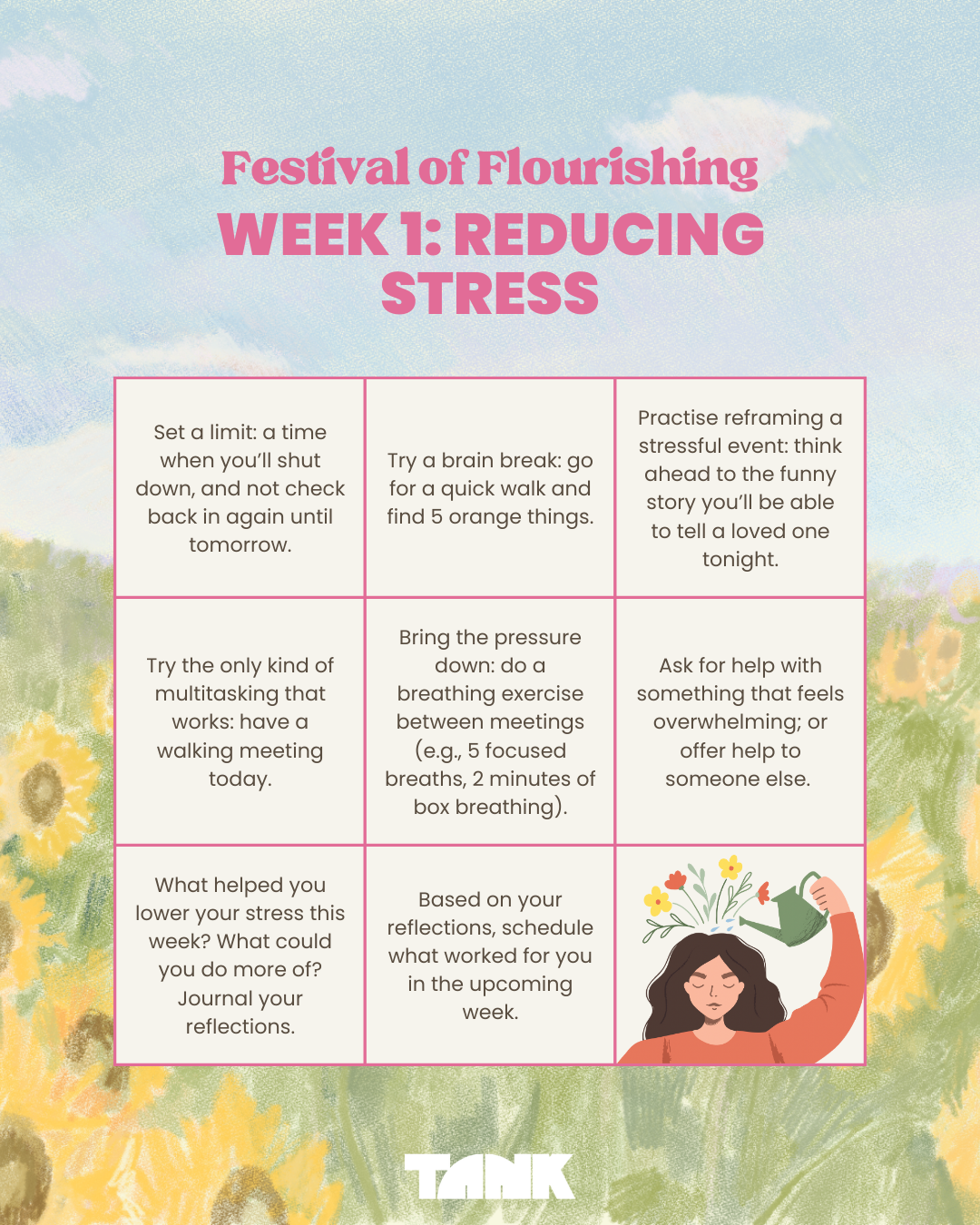The Festival of Flourishing begins today

October is Mental Health Month, and we'd like to keep the focus squarely on the "health" part of "mental health."
From Monday 30 September through to Friday 1 November, we're offering fun, practical daily experiments in flourishing. They'll help you bring down stress, improve recovery, tune in to what your nervous system is telling you, and put the pieces of the puzzle together in a way that works for you.
Week 1: reducing stress
This first week of daily experiments is all about reducing stress.
We do need some stress. When it comes in short, sharp bursts, stress is good for us: it helps us perform at our best. As long as it’s not too intense or too constant, stress makes us more resilient over time. The right kind of stress helps us flourish.
But when it’s out of control, stress can put a real hole in your tank.
That’s why this week’s experiments are all about reducing stress where it’s not helpful - fixing some of those holes!

Experiment 1: set a time limit
It's so easy for the to-do list to rule your shut-down time. As long as there's still work left to do, there's a temptation to keep going. Sometimes it even feels like getting that one last thing done is what's standing between you and being able to relax.
If that sounds like you, try this: set yourself a time when you'd like to clock off, and plan the day's work around that. Set the expectation with yourself (and anyone else who needs to know) that you'll be shutting down, and unavailable until the following day. And then here's the hard part: stick to the plan.
Here's why this is worthwhile:
- - It forces you to focus on the most important tasks for the day: if the day is limited, so is the list you can tackle
- - It closes the learning loop around how long things really take (and how long they really need to take)
- - It strengthens your sense of control, and done well, flags to your team that you can get the right things done, super-efficiently
Experiment 2: try a brain break
Even a shorter working day needs to be broken into bite-sized chunks. Research tells us that most people start to lose focus after two hours on a task. One of the best ways to do a reset is to get some fresh air and a change of scenery. Even a ten-minute walk where your focus is shifted to the external world can be effective.
There's a bonus to this one, too: there's good evidence that movement and giving your brain just enough to keep it occupied are two great ways of boosting creativity.
Experiment 3: practise reframing
When stress is such a physical experience, it's easy to forget that the stress response is often as much about how we interpret an event as it is about the event itself.
One of the best ways of getting some distance on whatever's causing you stress is to think ahead to the story you'll be able to tell about it. Unless you're in a really difficult spot, Future You is probably going to be able to find some humour in it, and humour is an excellent antidote to stress.
Experiment 4: the only kind of multitasking that works
It's true that the brain can only really attend to one thing at a time. That means that when you think you're multitasking, what you're really doing is switching focus very rapidly across several things. Pro-tip: this increases cognitive load and makes you less efficient, so it can be a significant contributor to stress: 0/10 would not recommend.
What does work is converting zoom or in-office time into fresh-air time. As long as you pick a safe place to walk, you get the benefit of moving your body without sacrificing the attention you need for the meeting.
Other options for movement multitasking: replace part of your commute with walking or cycling; or walk while you dictate a first draft to a voice-to-text app on your phone.
Experiment 5: bring the pressure down
When you're feeling constantly under time pressure, it's easy for your nervous system to get into the "bad" stress zone. Even if you start the day in the "good" stress zone, your body isn't built to stay there indefinitely. Slowly but surely, you'll notice you're edging into flight-or-fight.
When you're in flight-or-fight, it's very hard to perform well. Your thinking becomes more rigid and less creative. You're more likely to fall into old habits, rather than being able to adapt to the circumstances.
Slow, focused breathing exercises are a great tool for bringing your body and brain back into "good stress". They stimulate receptors in your chest cavity that activate your rest-and-digest system, reducing your body's stress response. They're effective, simple and generally invisible to everyone around you. Our two suggestions for this experiment are:
- - Take the slowest breath you can manage, feeling the air flow through your nostrils and deep into your diaphragm, and then back out again. Keeping your attention on the breath, repeat four more times.
- - Set a timer for two minutes. As you breathe in, count to 8. Hold that breath and count to 8. Release the breath to the count of 8. Pause and count to 8. Repeat until the timer is done.
Experiment 6: ask for help, or offer it
We're social animals, but many of us have been taught that success is a solo endeavour. This can mean that we miss opportunities to lighten our own load, and that of others.
The research tells us two things that should make us reconsider:
- - rather than being regarded as a burden on others, people who ask for help are generally viewed more positively than those who don't
- - counter-intuitively, the most effective way to reduce a persistent feeling of being short on time is to offer some to someone else
Experiment 7: reflect on the week
Spoiler alert: this will be experiment 7 every week of the Festival. There's decades of research to show that reflecting on our experiences is good for us. Even when it's done inconsistently - for example as a one-off exercise to process a specific event - it has a positive effect on mental and physical health.
So, take a few minutes this week to jot down what you've tried, what worked and what didn't, and what you'd like to carry through to the week ahead.
And we'll see you next week!
